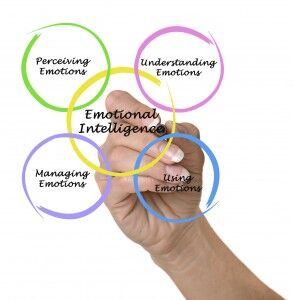By Janine Schindler, MCC
I was introduced to the topic of emotional intelligence (EI) when I came across Daniel Goleman’s 1995 first bestseller. Since then he has continued his research and writing and I have witnessed the value EI plays for both individuals and organizations that I work with. I’d like to take this opportunity to share with you some highlights that I know will make a difference for you.
 No matter what you do for a living, your intelligence quotient (IQ) counts for at most 25% of your effectiveness. Your emotional intelligence (EI) – how well you deal with people, manage relationships and understand yourself – counts for much of the rest. To reach your highest level of competence professionally, you must know how to manage your emotions. You also must develop a fine sense of how other people feel – and what they need.
No matter what you do for a living, your intelligence quotient (IQ) counts for at most 25% of your effectiveness. Your emotional intelligence (EI) – how well you deal with people, manage relationships and understand yourself – counts for much of the rest. To reach your highest level of competence professionally, you must know how to manage your emotions. You also must develop a fine sense of how other people feel – and what they need.
Daniel Goleman’s research has found that Emotional Intelligence is twice as important for star performance as IQ and technical expertise combined. The more senior position you have, the more critical EI becomes, accounting for close to 90% of success in top leadership positions. He further found that people with high levels of EI had the skills necessary to inspire, lead and persuade others to follow them.
Neither EI nor IQ guarantees success. They are merely the raw materials needed to learn and develop the competence vital for top performance at work.
Emotional Intelligence principles provide a way to understand and assess people’s behaviors, management styles, attitudes, interpersonal skills, and potential. EI is an important consideration in human resources planning, job profiling, recruitment interviewing and selection, management development, customer relations and customer service, leadership, team building and more. Unlike IQ, which takes years to enhance, EI skills can be improved any time. I share the following 7 steps for you to work through to enhance your own EI:
1. Know your strengths and weaknesses.
In what areas do you need to improve? Listening? Persuasion? Self-awareness? Temper control? Before you even try to change, ask yourself honestly, “Does this skill really matter to me? Am I willing to put in the time and effort?”
2. Define specifically the emotional areas you want to improve.
Think of real situations in which new habits would be a big help.
3. Become aware of your behavior in critical situations.
What do you think when a direct report asks you a question? How do you feel? A little irritated? Impatient? Exactly how do you react? Do you interrupt the person? Do you let your attention wander?
4. Look for EI role models
If you know someone who is a wonderful listener, watch him/her closely. If not, try to visualize, in specific detail, just how such an expert would act. Pattern your own behavior after this person, using real on-the-job situations as a learning lab.
5. Seek feedback from trusted friends and coworkers.
Ask them to watch how you work and give you objective assessments.
6. Track your changes, and treat lapses as learning opportunities.
If you slip and revert to a pattern you’re trying to change, don’t give yourself despairing messages. Instead of telling yourself, “I’ll never be any different,” ask, “What can I learn from this?” Consider the circumstances that actually led to the lapse. Was it stress? A deadline? Fatigue Make it a point to observe yourself more carefully in these situations.
7. Keep practicing until the new behavior pattern has become a real habit
— or an automatic response that you don’t have to think about. Be patient and realistic. Meaningful change almost always takes a matter of months — not weeks.
Improving Emotional Intelligence requires increasing your level of awareness, gaining some new skills, and practice practice practice! For help from an expert, contact us for an EI Assessment and Coaching Plan!
